Anti-inflammatory Effects of Myrrh Ethanol Extract on Particulate Matter-induced Skin Injury
Article information
Abstract
Objectives
Myrrh have been used as a traditional remedy to treat infectious and inflammatory diseases. However, it is largely unknown whether myrrh ethanol extract could exhibit the inhibitory activities against particulate matter (PM)-induced skin injury on human keratinocytes, HaCaT cells. Therefore, this study was aimed to investigate the inhibitory activity of myrrh ethanol extract on PM-induced skin injury in HaCaT cells.
Methods
To investigate the inhibitory effects of myrrh ethanol extract in HaCaT cells, the skin injury model of HaCaT cells was established under PM treatment. HaCaT keratinocyte cells were pre-treated with myrrh ethanol extract for 1 h, and then stimulated with PM. Then, the cells were harvested to measure the cell viability, reactive oxygen species (ROS), pro-inflammatory cytokines including interleukin (IL) 1-beta, IL-6, and tumor necrosis factor (TNF)-α, hyaluronidase, collagen, MMPs. In addition, we examined the mitogen activated protein kinases (MAPKs) and inhibitory kappa B alpha (Iκ-Bα) as inhibitory mechanisms of myrrh ethanol extract.
Results
The treatment of myrrh ethanol extract inhibited the PM-induced cell death and ROS production in HaCaT cells. In addition, myrrh ethanol extract treatment inhibited the PM-induced elevation of IL-1beta, IL-6, and TNF-α . Also, myrrh ethanol extract treatment inhibited the increase of hyaluronidase, MMP and decrease of collagen. Furthermore, myrrh ethanol extract treatment inhibited the activation of MAPKs and the degradation of Iκ-Bα.
Conclusions
Our result suggest that treatment of myrrh ethanol extract could inhibit the PM-induced skin injury via deactivation of MAPKs and nuclear factor (NF)-κB in HaCaT cells. This study could suggest that myrrh ethanol extract could be a beneficial agent to prevent skin damage or inflammation.
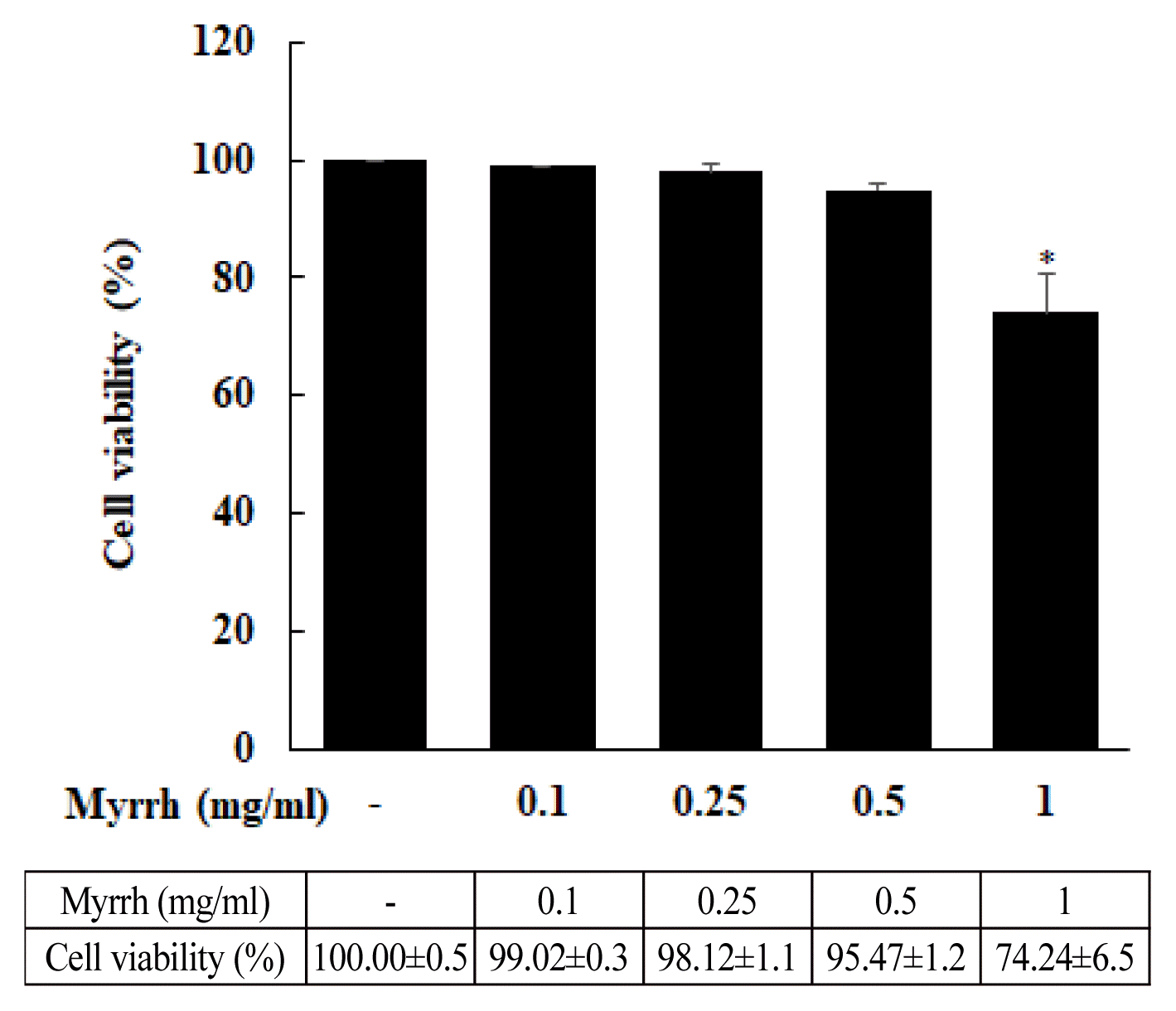
The cytotoxicity of Myrrh ethanol extract in HaCaT cells
The cell viability was measured by MTT assay. HaCaT cells were incubated with or without Myrrh ethanol extract as indicated doses for 24 h. The similar results were obtained from three additional experiments. *p < 0.05 significant as compared to normal.
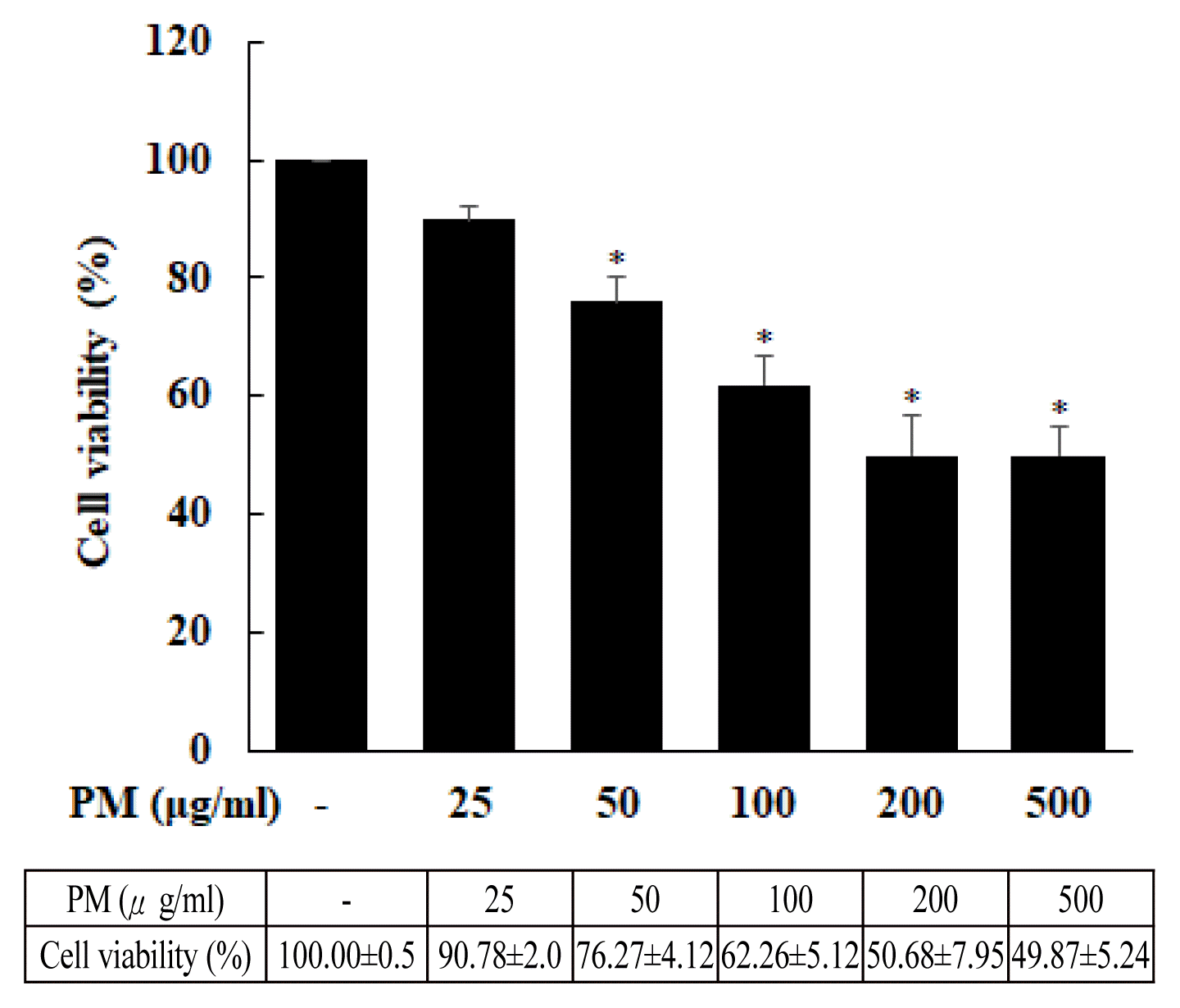
The cytotoxicity of PM (particulate matter) in HaCaT cells
The cell viability was measured by MTT assay. HaCaT cells were incubated with or without PM as indicated doses for 24 h. The similar results were obtained from three additional experiments. *p < 0.05 significant as compared to normal. N.S. indicates non-significant.
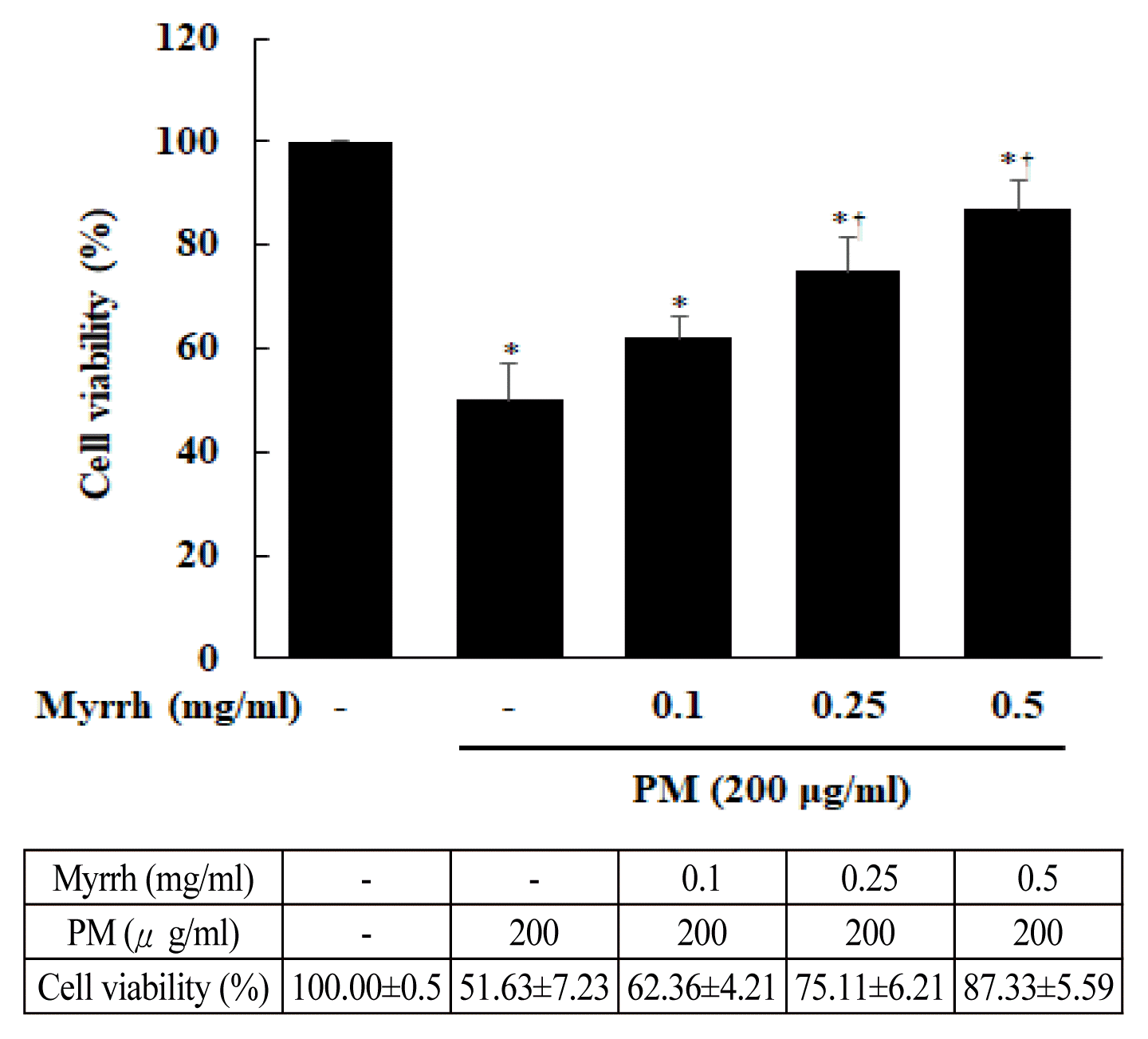
The effects of Myrrh ethanol extract on PM-induced cell death in HaCaT cells
The cell viability was measured by MTT assay. HaCaT cells were pre-treated with Myrrh ethanol extract for 1 h, and then incubated with PM as indicated doses for 24 h. The similar results were obtained from three additional experiments. *p < 0.05 significant as compared to normal. +p < 0.05 significant as compared to PM alone
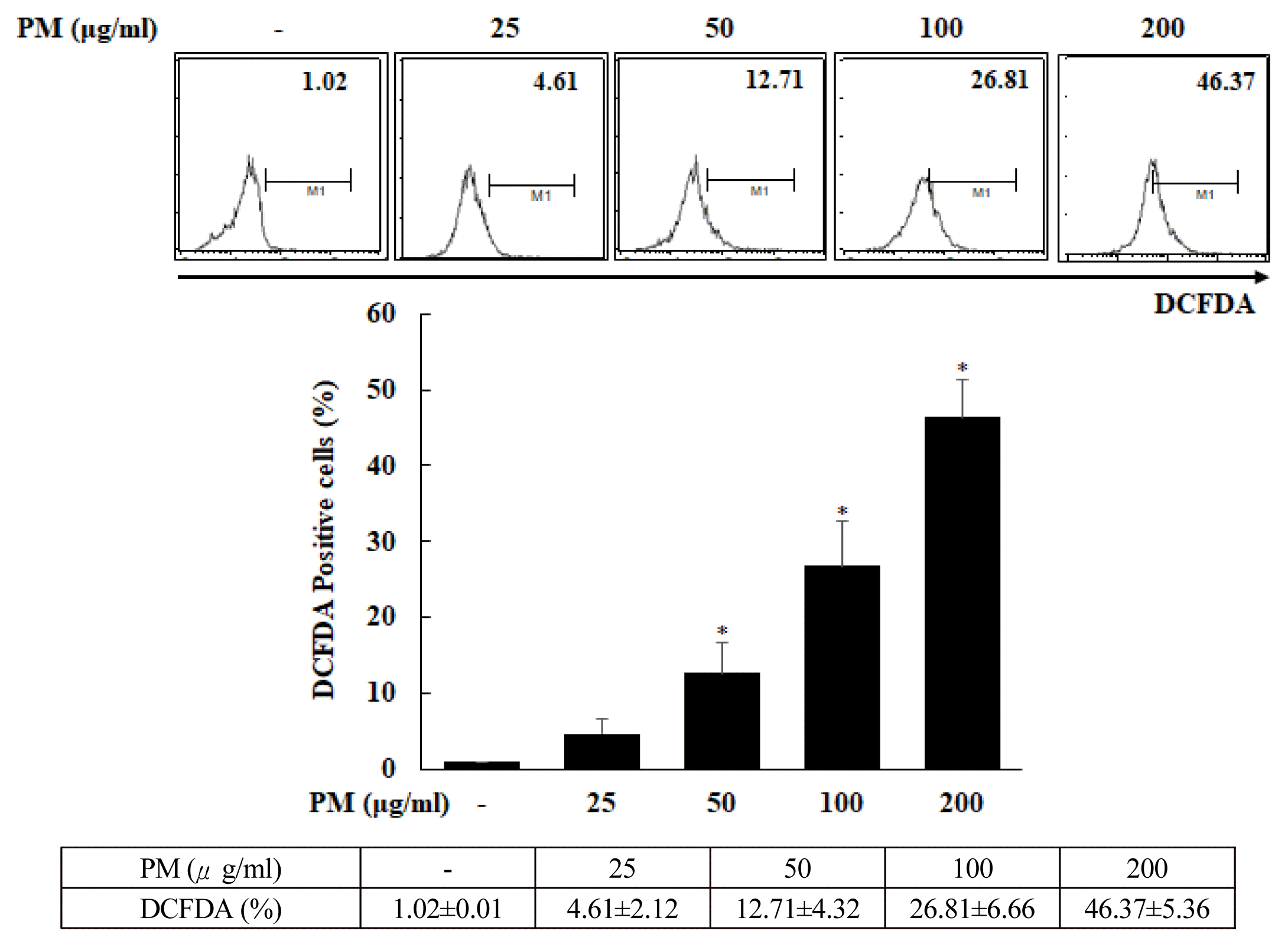
The effects of PM (particulate matter) on ROS production in HaCaT cells
The ROS production were measured by relative DCFDA intensity using FACS. HaCaT cells were incubated with or without PM as indicated doses for 24 h. The similar results were obtained from three additional experiments. *p < 0.05 significant as compared to normal.
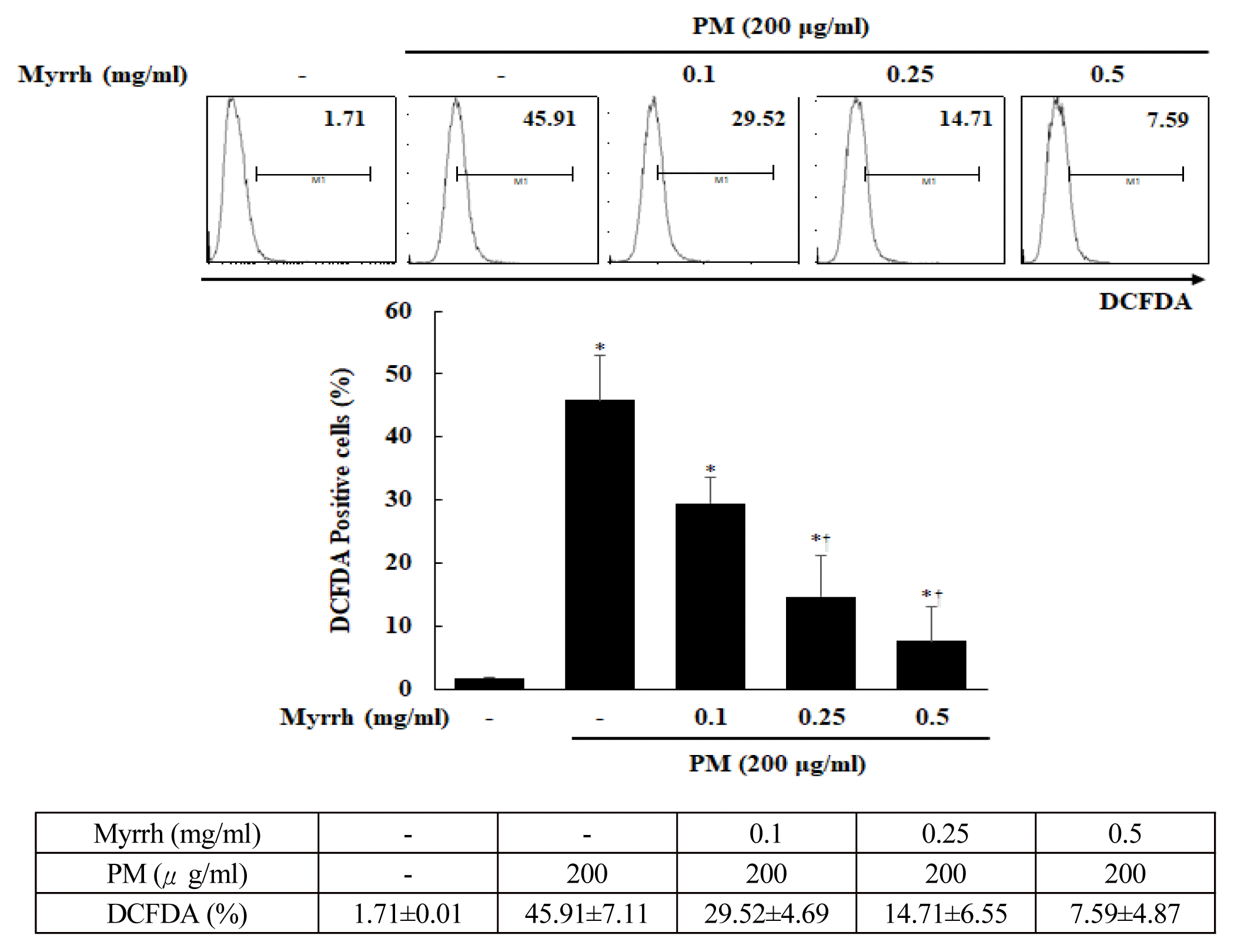
The effects of Myrrh ethanol extract on PM-induced ROS production in HaCaT cells
The ROS production were measured by relative DCFDA intensity using FACS. HaCaT cells were pre-treated with Myrrh ethanol extract for 1 h, and then incubated with PM as indicated doses for 24 h. The similar results were obtained from three additional experiments. *p < 0.05 significant as compared to normal. +p < 0.05 significant as compared to PM alone
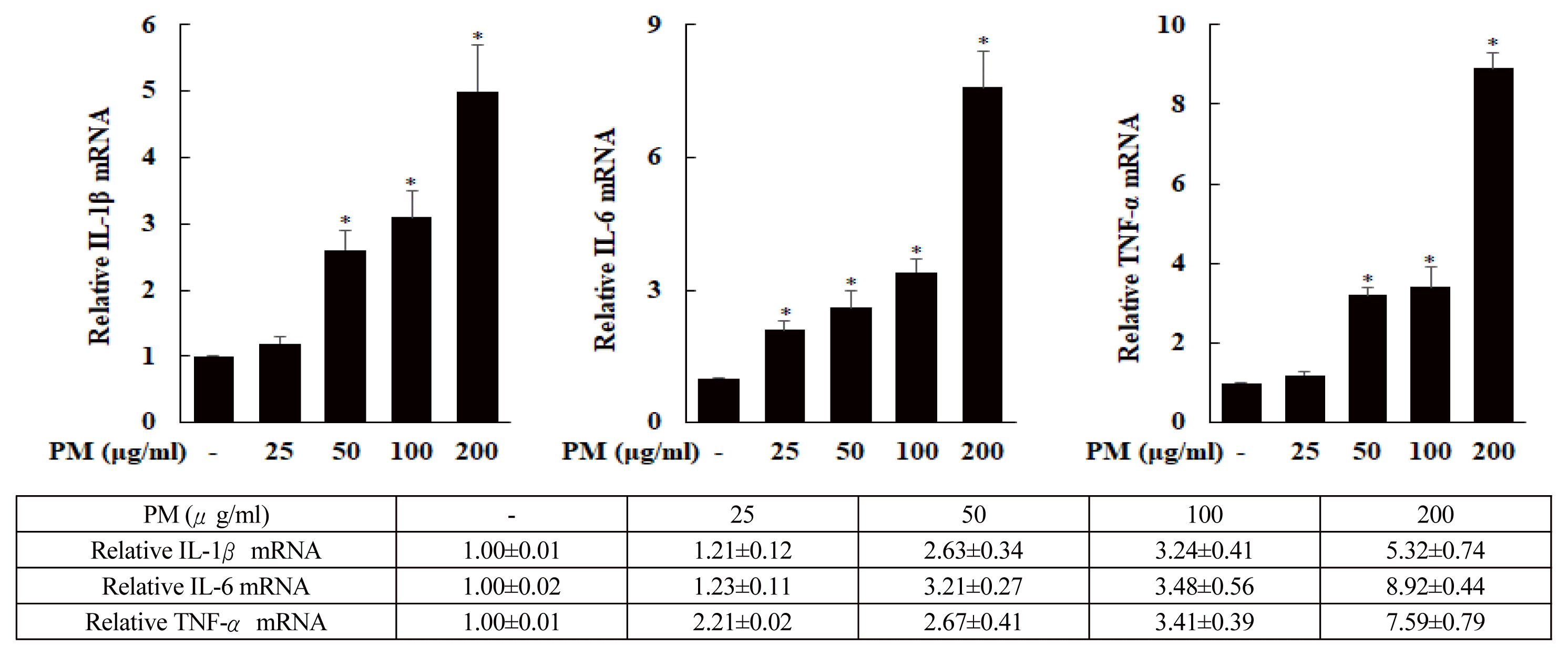
The effects of PM (particulate matter) on pro-inflammatory cytokines in HaCaT cells
The pro-inflammatory cytokines were measured by realtime RT-PCR. HaCaT cells were incubated with or without PM as indicated doses for 24 h. The similar results were obtained from three additional experiments. *p < 0.05 significant as compared to normal.
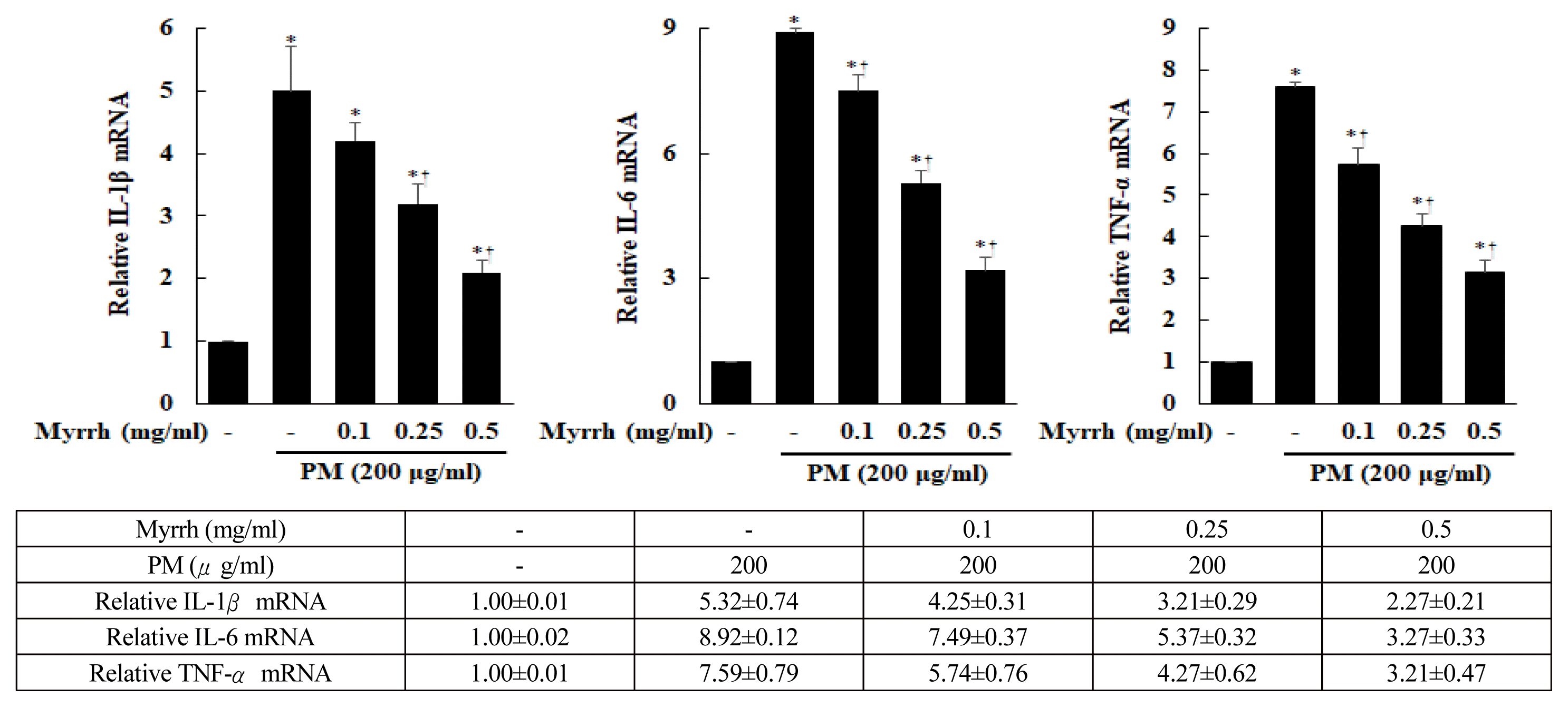
The effects of Myrrh ethanol extract on PM-induced pro-inflammatory cytokines in HaCaT cells
The pro-inflammatory cytokines were measured by realtime RT-PCR. HaCaT cells were pre-treated with Myrrh ethanol extract for 1 h, and then incubated with PM as indicated doses for 24 h. The similar results were obtained from three additional experiments. *p < 0.05 significant as compared to normal. +p < 0.05 significant as compared to PM alone
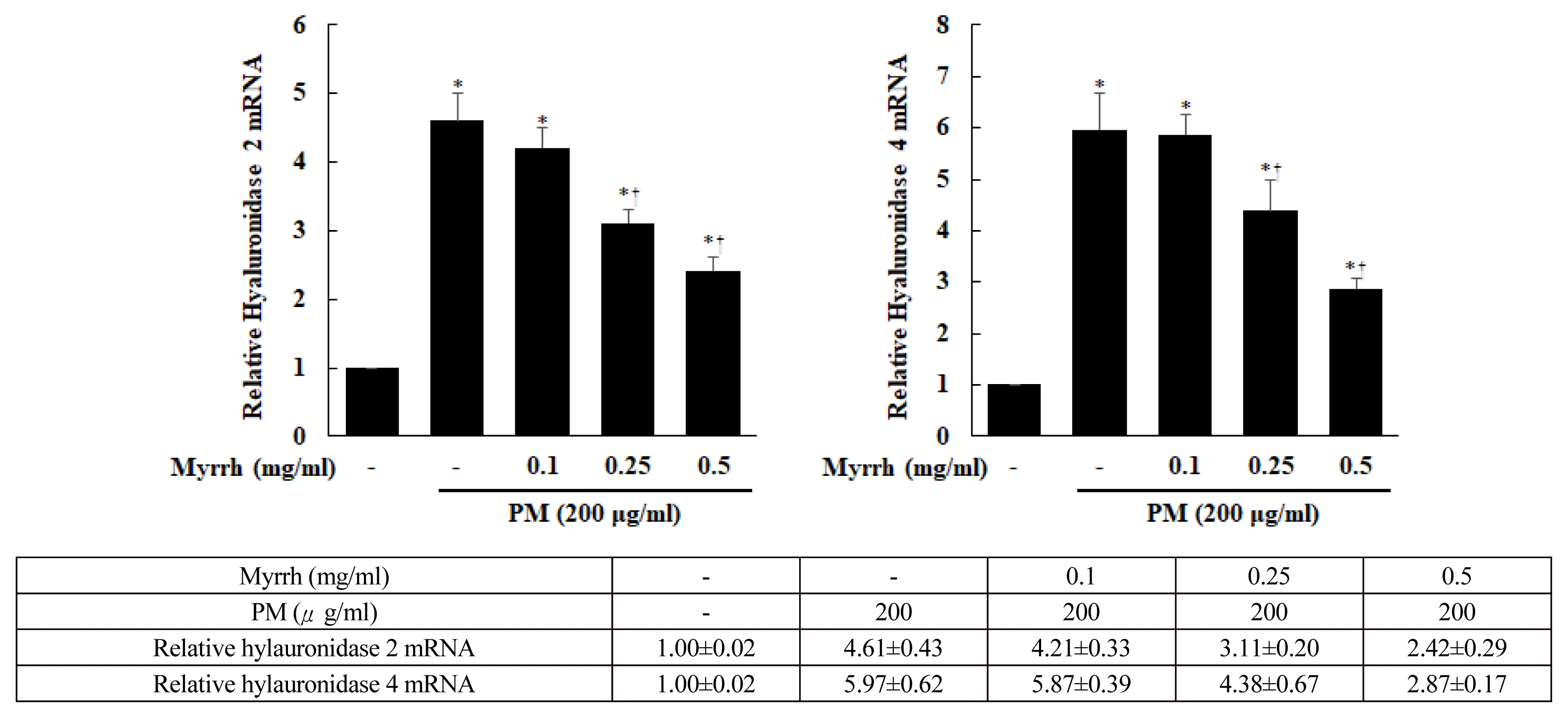
The effects of Myrrh ethanol extract on PM-induced hyaluronidase 2 and 4 in HaCaT cells
The mRNA expression of hyaluronidase 2 and 4 were measured by realtime RT-PCR. HaCaT cells were pre-treated with Myrrh ethanol extract for 1 h, and then incubated with PM as indicated doses for 24 h. The similar results were obtained from three additional experiments. *p < 0.05 significant as compared to normal. +p < 0.05 significant as compared to PM alone
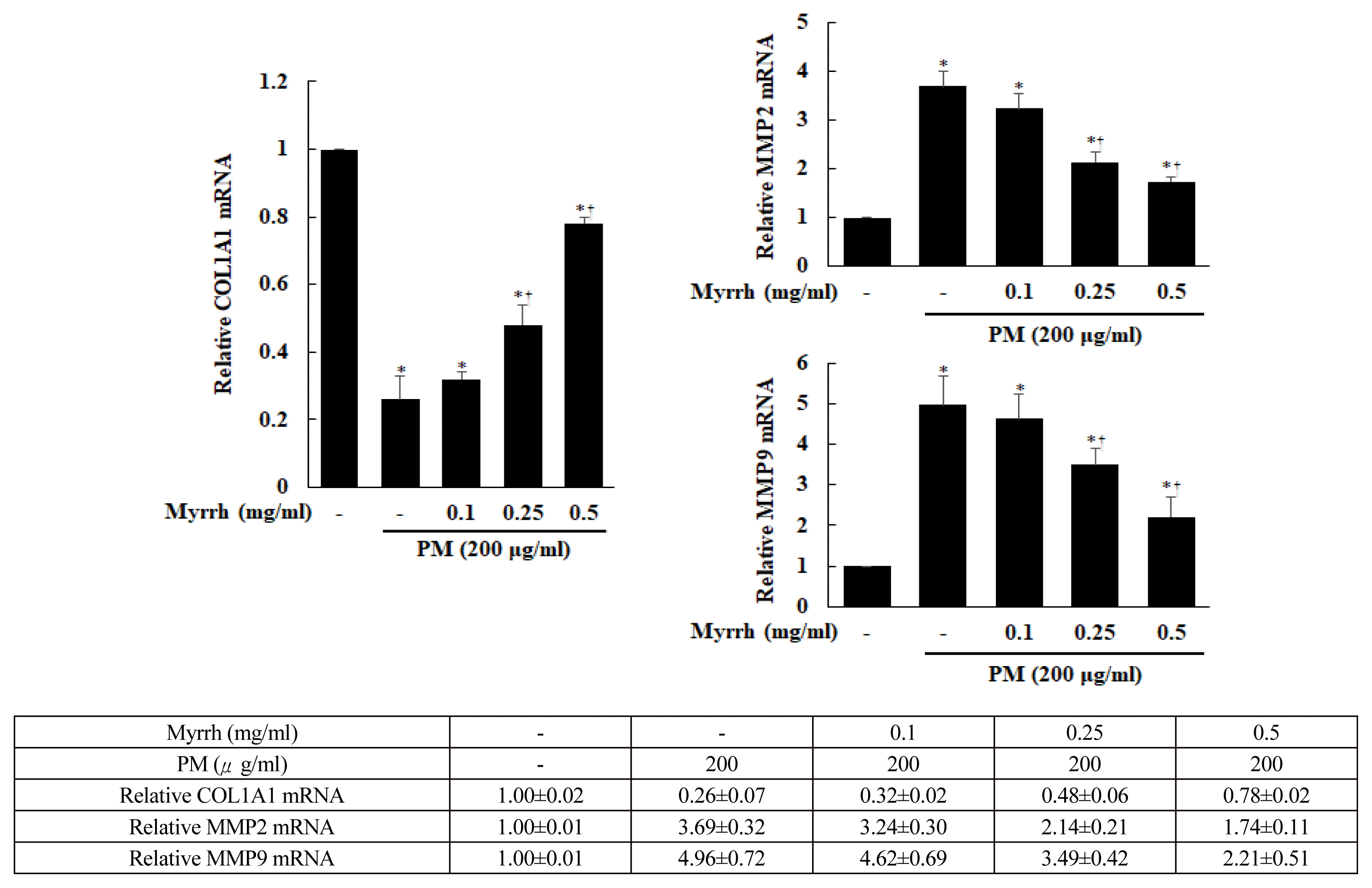
The effects of Myrrh ethanol extract on PM-induced collagen and MMP 2 and 9 in HaCaT cells
The mRNA expression of COL1A1, MMP-2 and MMP-9 were measured by realtime RT-PCR. HaCaT cells were pre-treated with Myrrh ethanol extract for 1 h, and then incubated with PM as indicated doses for 24 h. The similar results were obtained from three additional experiments. *p < 0.05 significant as compared to normal. +p < 0.05 significant as compared to PM alone
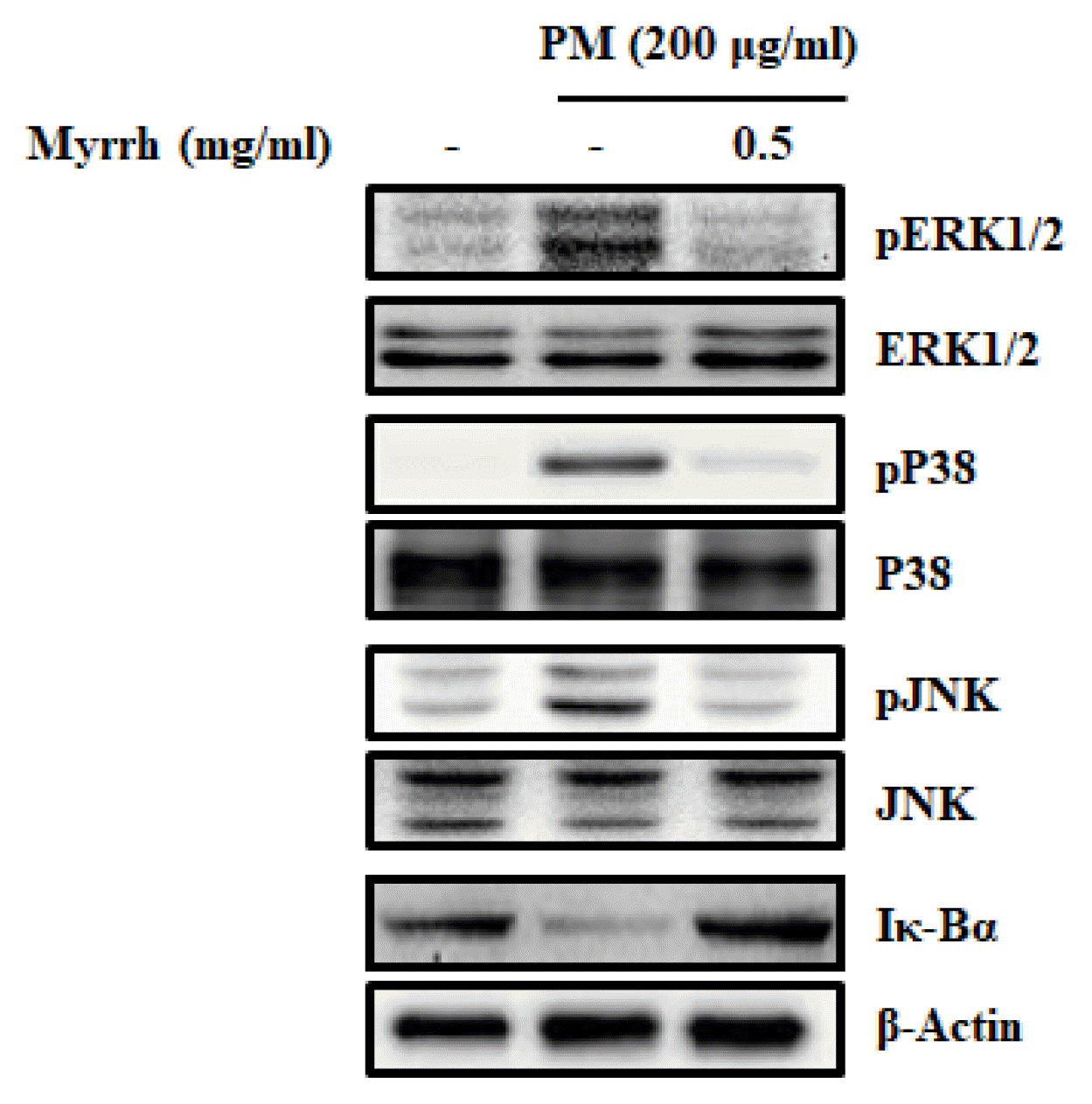
The Effects of Myrrh ethanol extract on PM-induced MAPKs and the degradation of Iκ-Bα in HaCaT cells
HaCaT cells were pre-treated with Myrrh ethanol extract for 1 h, and then incubated with PM for 30 min. The phosphorylation of ERK1/2, P38 and JNK, and the degradation of Iκ-Bα were analyzed by western blotting. Total ERK1/2, P38, JNK and β-actin were used as loading controls. The similar results were obtained from three additional experiments.
